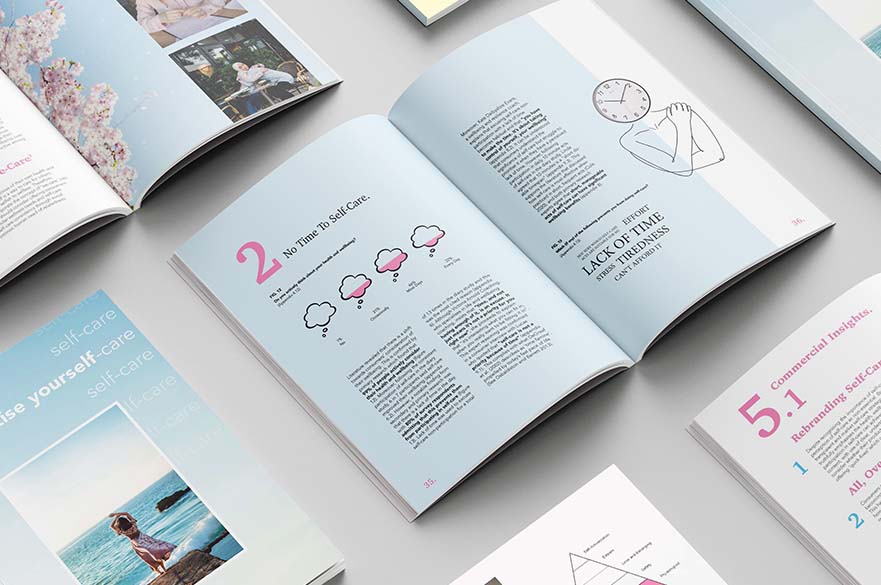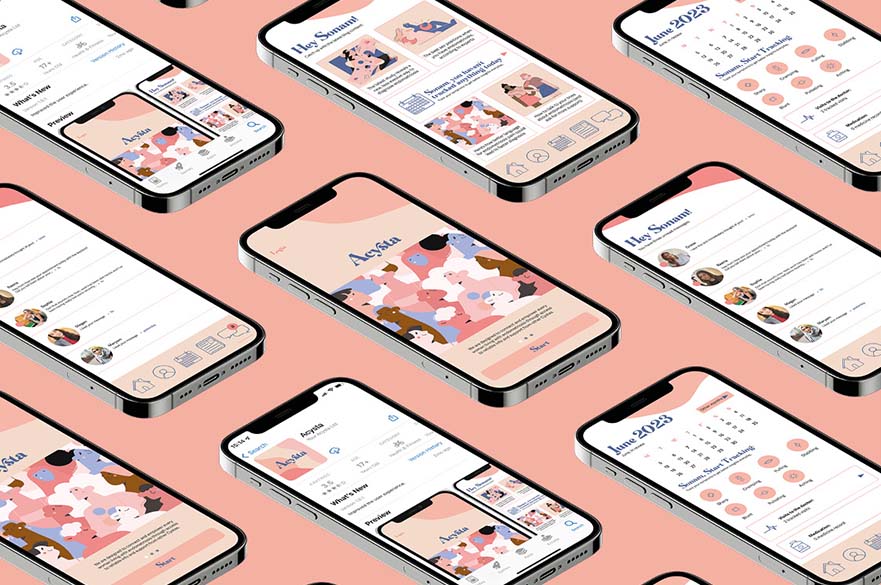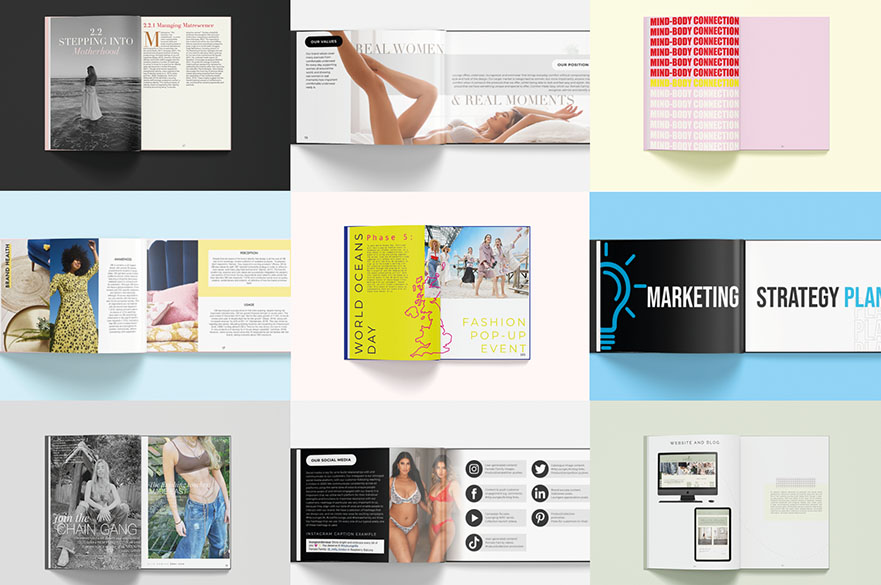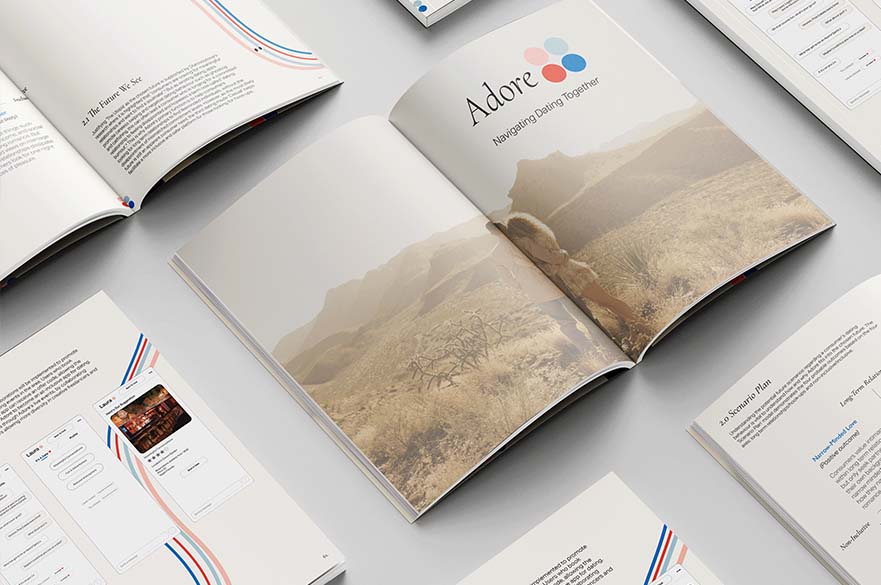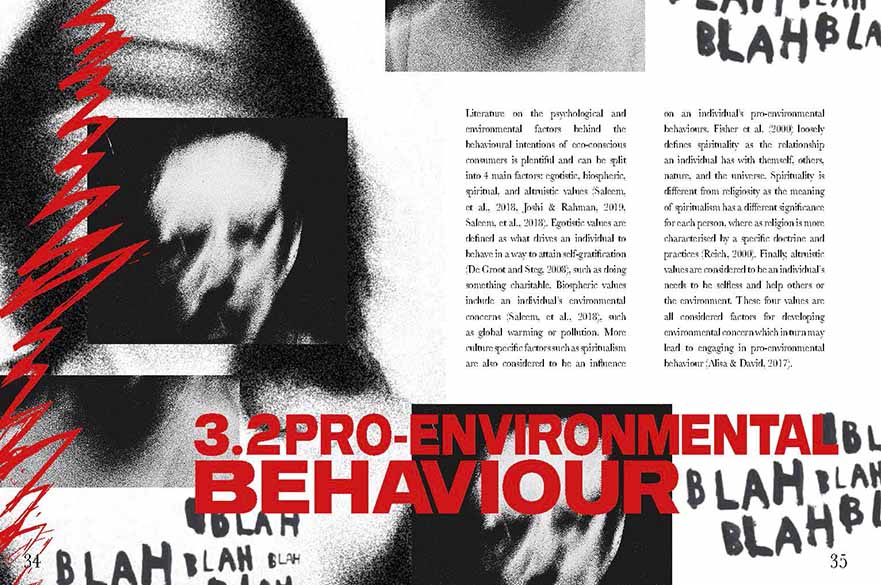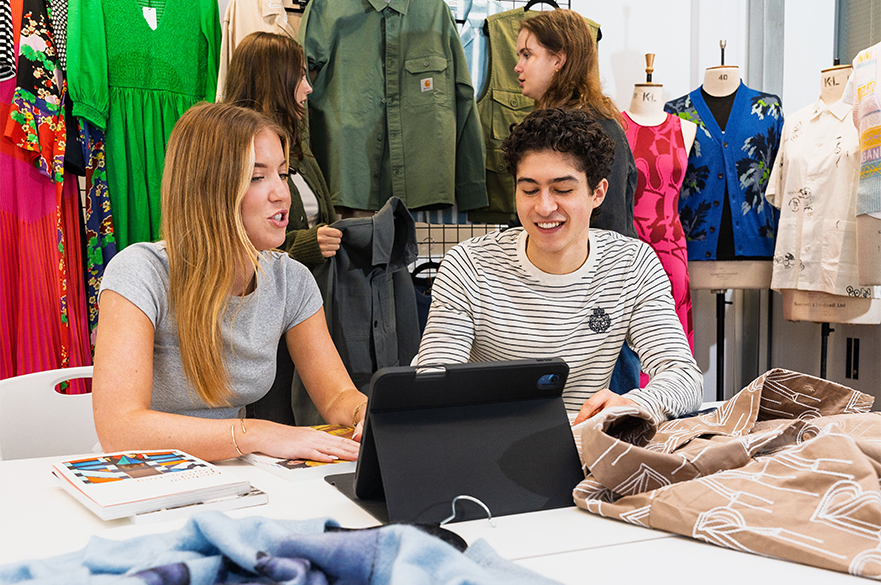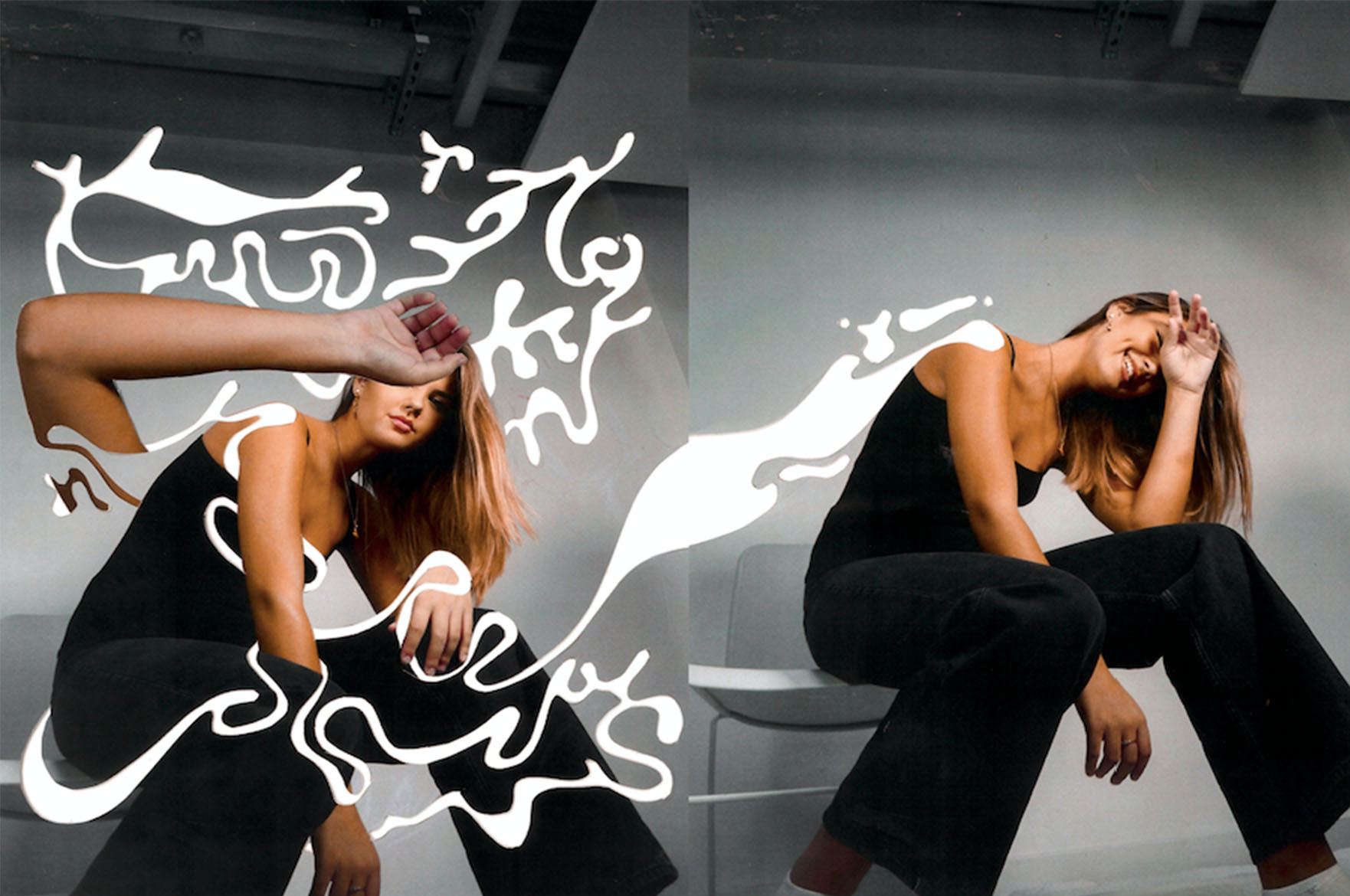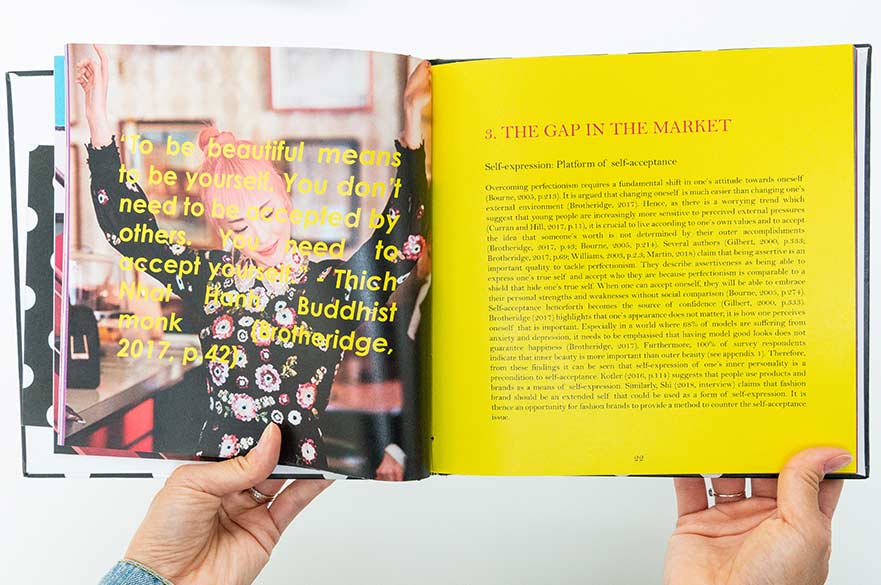This course is in Clearing
Offers from 80 tariff points
About this course
Fashion marketing and branding is fast-paced and continually evolving. At the heart of this course is the understanding that creativity is an essential part of business and brand success.
Strategic business minds and fashion marketers have always been central to elevating iconic labels to the enduringly desirable brands they are today. In a sector where consumer habits can change overnight, clever marketing and distinct branding are vital.
This course is designed by and for creative marketeers, business innovators and fashion lifestyle enthusiasts. It’s about reconstructing the iconic, championing sustainable practice, and bringing fresh initiative to the forefront of fashion branding and marketing. Become an agile, creative and strategic visionary thinker; stand out in a complex global business environment; and prepare for a lucrative career in an industry like no other – where strategy meets style.
-
Make industry connections as you work on live briefs for brands such as Adidas, Next and Aspinal of London.
-
Attend creative events and visit industry premises throughout the UK and in Europe’s fashion capitals.
-
Study a semester abroad at a university such as the Fashion Institute of Technology, New York.
15
What you’ll study
BA Fashion Marketing and Branding at NTU is for strategic thinkers: you’ll use market analysis and business acumen to develop and prepare briefs for creative agencies. You’ll study modules which delve into the theories behind fashion marketing, branding, self-identity and cultural influences, and apply this knowledge to live project briefs set by some of the industry’s biggest labels.
Sustainability is a hot topic in fashion, and it’s our responsibility to protect the environment in order to ensure the longevity of the industry. That’s why sustainable practice is built into every element of BA Fashion Marketing and Branding at NTU.
You’ll:
- tackle live briefs from brands such as Gymshark, Lacoste, Adidas, Next, FaceGym, Clarks, Craghoppers, Aspinal of London and Sunspel
- become proficient in using immersive technology and Adobe Creative Suite to communicate your ideas
- unpack key theories and challenge contemporary issues within fashion
- attend guest lectures from industry experts, including company CEOs, marketing directors and authors
- gain crucial work-like experience in your second year, and have the choice to get an additional Certificate or Diploma in Professional Practice during an optional placement year
- collaborate with students from other disciplines like fashion design in Year Two to develop a brand launch pack for a new business, identifying key strategic areas including values, competitors, appropriate channels and branding
- tailor your degree with optional modules covering the breadth of fashion marketing and branding – from merchandising and live event production, to clothing longevity and creative coding
- showcase your learning in final year with an individual research project which expresses your style, incapsulates your skills, and aligns with your career aspirations.
There is an opportunity for students to undertake a placement year, and transfer to the Sandwich route, please see further details in the ‘Year Three’ section below.
Here’s a full breakdown of the modules you’ll be studying.
Visual and Cultural Influences
(20 credit points, first half of the year)
Learn about fashion and the trends in our society that influence what, where and how products are marketed and how consumers respond. You will study the significance of fashion and how it has evolved as a system of communication. You’ll look at how interconnected media, such as music, film and photography, as well as wider political, social and cultural factors inform important conversations around current challenges such as sustainability and consumption for brands. You will also develop your understanding of visual communication, building your skills in a range of tools and practices.
Principles of Fashion Marketing and Branding
(80 credit points, full year)
This module introduces you to the principles and theories that underpin the global fashion and lifestyle industry. You will begin to explore the psychological and personal motivations of consumer behaviour, and develop market research skills such as data analytics to explore how brands inform and construct key fundamentals such as brand identity, positioning and value.
Visual and Self Identity
(20 credit points, second half of the year)
You will explore how sub-cultures are represented visually to understand how one signifies an identity from the myriad of influences that exist in the contemporary world. This will inform your own research as you consider the importance of identification from a variety of standpoints. Working collaboratively you will look at the ways we identify ourselves with tribes from an ideological standpoint, in relation to the medium of publications.
Marketing Strategy and Insight
(40 credit points, first half of the year)
This module will simulate industry practice and explore how marketing strategy, which lies at the heart of all key business decisions is translated into actionable insight. Working with brands via a team and individual project you will demonstrate strategic decision-making by understanding competitor analysis, integrated marketing strategies, project and marketing planning and situational analysis to develop creative business solutions.
Brand Environments
(40 credit points, second half of the year)
Option 1: Brand Development and Promotion gives you the opportunity to work in collaboration with another course from NTU to launch and craft a new brand which fuses differing disciplines together.
Option 2: Placement in Professional Practice is a work placement option giving you the chance to apply theory to real-life business situations and evidenced solutions while gaining first-hand experience of the roles and responsibilities within the fashion and lifestyle industry.
CoLab: Research, Exploration and Risk-taking
(20 credit points, second half of the year)
Through active participation with team-based problem solving, you will work together in mixed teams on a project where you will use your creative ideas to generate solutions to the challenge or brief. Your project will allow you to explore how creativity can make an impact in society, as you choose a theme of sustainability, social justice, enterprise and innovation or community. This collaborative learning experience will expose you to a range of new processes and approaches that will develop your creative thinking.
Optional module
You will also choose one 20-credit module from:
- Trend Forecasting
- Buying, Merchandising and Product Fundamentals
- Digital Marketing and Communication
- Creative Live Event Production
- Web3 & Creative Autonomy
- Beauty Industry: Innovation to Impact
- Fashion Photography: Cover Shoot
- Fashion Styling
Optional Placement Year (Sandwich)*
We have an option for all of our students to undertake a placement year (Sandwich) and allow you to decide whether this is right for you once you have completed years 1 and 2 of your course. This time spent working in industry provides our students with crucial work experience, which is highly prized and much sought after by employers upon graduation. If you are successful in securing a placement you will have the chance to gain an additional Certificate or Diploma in Professional Practice, dependent on duration.
The additional placement year incurs a fee. For international students considering the transfer to the 4-yr SW route it’s important to seek advice from the International Student Support team and the Home Office regarding any potential visa implications and costs. For UK students, advice should also be sought regarding SLC eligibility, if applicable.
* If you choose to take the sandwich route option, you will still need to apply for this course with the full-time UCAS code: WN25
Strategic and Creative Solutions
(100 credit points, full year)
This three-part module will see you challenged on your understanding of trends, research, debates and popular opinions as you identify significant trends or shifts in behaviour and their likely future consequences upon the fashion and lifestyle industry. You will then develop your individual research project, which will inform a full body of work in the form of either a focused research paper, a business plan presenting an innovative concept, or the realisation of the concept into functioning prototypes or mock ups.
Project Me
(20 credit points, full year)
Personal and professional development and reflection is embedded through the course. This module combines all your learnings and focuses on developing a career strategy that will take you from graduation into industry or further study. With a focus on understanding the contemporary fashion marketing landscape and transferrable skills, you will consider your own strengths and where your aspirations lie, showcasing your own unique selling points through a digital space.
We regularly review and update our course content based on student and employer feedback, ensuring that all of our courses remain current and relevant. This may result in changes to module content or module availability in future years.
Don’t just take our word for it, hear from our students themselves
Student Work
Video Gallery
How you're taught
On this fashion marketing and branding degree, you’ll be taught by a team with over 300 years of combined teaching and industry experience. You’ll also learn from impressive guest lecturers – previously, these have included Angelique Green (CEO of The Mighty Shed), Anthony Tasgal (author of The Storytelling Book) and Ari Peralta (founder and CEO of Arigami).
You’ll learn through a mix of:
- lectures, exploring fundamental fashion theory and answering the all-important question: what is fashion marketing and branding?
- seminars for learning key skills, like how to use immersive technology to develop and communicate your ideas
- live projects, usually set by marketing or brand directors during a visit to their company’s headquarters, with the chance to present your finished work to a panel of high-ranking employees at that organisation
- small-group tutorials and workshops, for focused discussion and homing in on your ongoing projects
- Co Lab, bringing together students from different disciplines to collaborate on projects set by industry partners
- field trips to brand headquarters, exhibitions and trade fairs across the UK and Europe to learn about industry practice, as well as a residential trip to a European destination.
Study trips and exchange opportunities
Fashion marketing and branding is a global business, and international impact is at its core. On this course, you’ll get to experience the industry firsthand on local and overseas field trips to exhibitions, museums and trade fairs, including an optional visit to a European fashion capital – think Milan, Paris or Berlin.
The costs of essential field trips are covered by your course fees.
You can also do an international exchange at institutions such as Fashion Institute of Technology in New York or Amsterdam Fashion Institute for one semester in Year Two. If you’re interested in studying abroad, we’ll support you at every step of arranging it.
How you're assessed
People excel in different ways, and we want everybody to have the best possible chance of success. On NTU’s fashion marketing and branding course, you will be assessed on a range of individual and group presentations, marketing reports, and your final year project.
Visit our ‘We Are Creatives’ showcase to see this year's graduating students’ work.
Careers and employability
Fashion marketers and fashion branding experts will always be in demand, even in today’s technological landscape. That’s because those with fashion branding and fashion marketing degrees harness vital qualities which AI can’t replicate: human creativity, and the ability to formulate and communicate innovative strategies. At NTU, you’ll learn a plethora of transferable and adaptable skills – futureproofing your career in fashion and marketing, and enabling you to thrive in these ever-changing fields.
The work you’ll complete is designed to set you up with an impressive portfolio and an extensive network of industry contacts, preparing you for life after graduation.
Our BA Fashion Marketing and Branding graduates have gone on to fill job roles such as:
- Assistant Marketing Manager at Boots No.7
- Global Ecommerce Content and Production Manager at Jimmy Choo
- Nike Customer Journey Manager at Frasers Group
- Marketing Graduate at JD sports
- Partner Coordinator at Mercedes Benz Formula 1 Team
- Senior Brand Manager at Nescafe, Nestle
Every NTU student can access tailored support from our Employability team for three years after graduation, as well as our comprehensive online career resources for life.
Placements
Industry experience is highly prized and sought after by employers – that’s why work-like practice is built into this course, in the form of live briefs and placements. You’ll also have the option to carry out a year-long placement in your third year, during which you can complete a Certificate or Diploma in Professional Practice.
Brands and fashion marketers which students have previously conducted placements with include:
- Gymshark
- Urban Outfitters
- Dior
- Phase Eight
- Adidas
- Gung Ho (brand and PR company)
- Converse
Showcase
You will exhibit your work to members of the creative industries at a showcase, and you may be selected to showcase at Graduate Fashion Week in London – where many of our previous students have won awards. These events are an excellent way to connect with potential employers, and some students secure jobs as a direct result of them.
What our students are doing now
Fashion Management students host International Women's Day Event
To celebrate International Women’s Day, our Final Year Fashion Management students hosted a community event with inspirational industry experts.
Fashion students attend design brief workshop with iconic Nottingham designer
NTU alumnae becomes first UK winner of Cannes Young PR Lions competition
Campus and facilities
As a BA Fashion Marketing and Branding student, you’ll mainly be based in our contemporary Barnes Wallis building on the City Campus. You’ll study alongside likeminded members of NTU’s fashion community in a range of comfortable creative spaces, including purpose-built editing suites and workshops.
Our City Campus has everything you’ll need to keep occupied between lectures. As well as the Boots Library and its beautiful roof garden, there’s a 100-station gym; a whole host of cafés, bars and restaurants catering to every taste; our Students’ Union and popular Global Lounge; plenty of relaxed spaces to tackle your assignments or catch up with friends; and much, much more!
If that’s not enough, just take a few steps off campus, and you’ll find yourself in the beating heart of Nottingham: one of Britain’s top 10 student cities, and a hub of creative activity. Get inspired by famed vintage fashion outlets such as Cow and Braderie, quirky independent businesses, and vibrant cultural hotspots like Nottingham Contemporary and Broadway Cinema.
Entry requirements
This course is in Clearing
Looking for a place in Clearing? We are accepting application and would love to hear from you!
UK students
This course is in Clearing
Looking for a place in Clearing? We are accepting applications and would love to hear from you!
Clearing requirements
From 80 UCAS tariff points from up to 4 qualifications.
To discuss our entry requirements and see what we can offer you, call us now on +44 (0)115 848 6000. Alternatively, if you already have your qualifications, apply online via our Clearing Application form.
Preparing for results day? Beat the queue and sign up for NTU Priority for up-to-date information about all things Clearing. You’ll get an offer ahead of Clearing, subject to you achieving the required grades on results day.
To find out what qualifications have tariff points, please use our tariff calculator.
Additional requirements for UK students
There are no additional requirements for this course.
Contextual offers
If you don’t quite meet our entry requirements, we might be able to make you a lower offer based on a range of factors, including your background (such as where you live and the school or college you attended), your experiences and your individual circumstances (you may have been in care, for example). This is called a contextual offer, and we get data from UCAS to help make these decisions. We do this because we believe everyone with the potential to succeed at NTU should have the opportunity to do so, no matter what barriers you may face.
Meeting our entry requirements
Hundreds of qualifications in the UK have UCAS Tariff points attached to specific grades, including A-levels, BTECs, T Levels and many more. You can use your grades and points from up to four different qualifications to meet our criteria. Enter your predicted or achieved grades into our Tariff calculator to find out how many points your qualifications are worth.
Other qualifications and experience
NTU welcomes applications from students with non-standard qualifications and learning backgrounds, either for year one entry or for advanced standing beyond the start of a course into year 2 or beyond.
We consider study and/or credit achieved from a similar course at another institution (otherwise known as credit transfer), vocational and professional qualifications, and broader work or life experience.
Our Recognition of Prior Learning and Credit Transfer Policy outlines the process and options available for this route. If you wish to apply via Recognition of Prior Learning, please contact the central Admissions and Enquiries Team who will be able to support you through the process.
Getting in touch
If you need more help or information, get in touch through our enquiry form.
International students
This course is in Clearing
Looking for a place in Clearing? We are accepting applications and would love to hear from you!
Clearing requirements
From 80 UCAS tariff points from up to 4 qualifications.
To discuss our entry requirements and see what we can offer you, call us now on +44 (0)115 848 6000. Alternatively, if you already have your qualifications, apply online via our Clearing Application form.
Preparing for results day? Beat the queue and sign up for NTU Priority for up-to-date information about all things Clearing. You’ll get an offer ahead of Clearing, subject to you achieving the required grades on results day.
We accept equivalent qualifications from all over the world. Please check your international entry requirements by country.
English language requirements: See our English language requirements page for requirements for your subject and information on alternative tests and Pre-sessional English.
Additional requirements for international students
If you need help achieving the academic entry requirements, we offer a Foundation preparation course for this degree. The course is offered through our partner Nottingham Trent International College (NTIC) based on our City campus.
English language requirements
View our English language requirements for all courses, including alternative English language tests and country qualifications accepted by the University.
If you need help achieving the language requirements, we offer a Pre-Sessional English for Academic Purposes course on our City campus which is an intensive preparation course for academic study at NTU.
Other qualifications and experience
If you have the right level of qualifications, you may be able to start your Bachelors degree at NTU in year 2 or year 3. This is called ‘advanced standing’ entry and is decided on a case-by case basis after our assessment of your qualifications and experience.
You can view our Recognition of Prior Learning and Credit Transfer Policy which outlines the process and options available, such as recognising experiential learning and credit transfer.
Sign up for emails
Sign up to receive regular emails from the International Office. You'll hear about our news, scholarships and any upcoming events in your country with our expert regional teams.
Getting in touch
If you need advice about studying at NTU as an international student or how to apply, our international webpages are a great place to start. If you have any questions about your study options, your international qualifications, experience, grades or other results, please get in touch through our enquiry form. Our international teams are highly experienced in answering queries from students all over the world.
Policies
We strive to make our admissions procedures as fair and clear as possible. To find out more about how we make offers, visit our admissions policies page.
